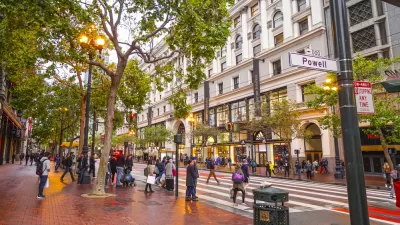Building on public lands and tweaking the city's inclusionary housing program are just two of the options being considered by San Francisco leaders and housing advocates to help alleviate the city's growing affordability crisis.
With developers increasingly opting for in-lieu payments instead of building below-market-rate housing, affordable housing advocates are pressing for changes to San Francisco's Inclusionary Affordable Housing Program to increase the supply of middle-income housing.
"As it stands, every new residential project of 10 or more units must price 12 percent of the units at below market rate, pay a fee to opt out or build below-market-rate units off-site," explains Jonah Owen Lamb.
"'If the developers would take that program seriously and build the units and stop feeing out ... we'd get more middle-income units,' said Peter Cohen, co-director at the Council of Community Housing Organizations. But with the hot real estate market, developers are gladly paying the fee instead of losing profits, so tweaks need to be made to the program to prevent that."
Increasing opt-out fees and "[giving] builders the option to have a wider variety of below-market-rate pricing for more middle-income units" are two of the ideas being explored.
In addition, "Mayor Ed Lee is calling on city departments to take inventory of their vacant and underdeveloped sites to determine which ones are ripe for development [of below-market-rate housing] -- examining everything from historic reservoirs to smaller parcels," reports Joshua Sabatini. "Lee has also appointed a housing task force, with recommendations due Feb. 1 on how to speed up and encourage housing development citywide."
FULL STORY: Ideas to increase middle-income housing in San Francisco floated

Alabama: Trump Terminates Settlements for Black Communities Harmed By Raw Sewage
Trump deemed the landmark civil rights agreement “illegal DEI and environmental justice policy.”

Study: Maui’s Plan to Convert Vacation Rentals to Long-Term Housing Could Cause Nearly $1 Billion Economic Loss
The plan would reduce visitor accommodation by 25% resulting in 1,900 jobs lost.

Planetizen Federal Action Tracker
A weekly monitor of how Trump’s orders and actions are impacting planners and planning in America.

Wind Energy on the Rise Despite Federal Policy Reversal
The Trump administration is revoking federal support for renewable energy, but demand for new projects continues unabated.

Passengers Flock to Caltrain After Electrification
The new electric trains are running faster and more reliably, leading to strong ridership growth on the Bay Area rail system.

Texas Churches Rally Behind ‘Yes in God’s Back Yard’ Legislation
Religious leaders want the state to reduce zoning regulations to streamline leasing church-owned land to housing developers.
Urban Design for Planners 1: Software Tools
This six-course series explores essential urban design concepts using open source software and equips planners with the tools they need to participate fully in the urban design process.
Planning for Universal Design
Learn the tools for implementing Universal Design in planning regulations.
Caltrans
Smith Gee Studio
Institute for Housing and Urban Development Studies (IHS)
City of Grandview
Harvard GSD Executive Education
Toledo-Lucas County Plan Commissions
Salt Lake City
NYU Wagner Graduate School of Public Service




























